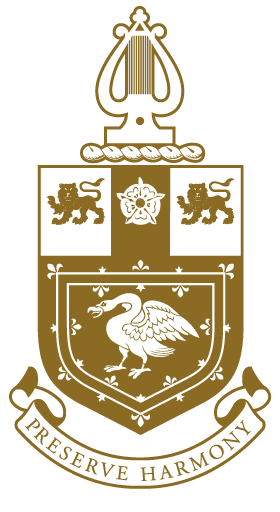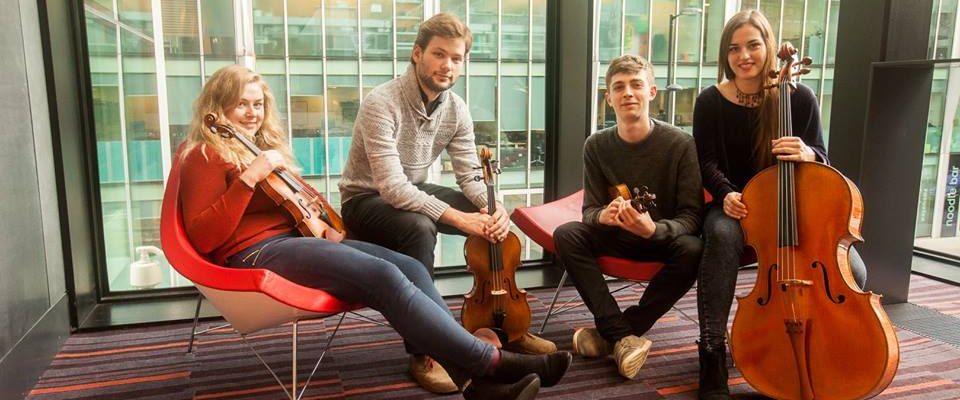Young Artist Interview: Leo Geyer
Musicians’ Company yeoman Leo Geyer is a prolific composer and conductor with an imaginative, daring and dramatic approach to music-making. The winner of several accolades including the 2017 Lord Mayor’s Composition Prize and RNCM Gold Medal Competition, Leo is the founder and artistic director of Constella OperaBallet, cover conductor for The Royal Ballet and music director for EMG Symphony Orchestra. His acclaimed theatrical works include The Mermaid of Zennor, described by The Times as “imaginative and beautifully shaped”.
When did your passion for making music begin?
My musical journey began from a dip out of the hat! My primary school offered flute and clarinet lessons and as they were oversubscribed, it was a lucky dip and I was picked for flute lessons. Not soon after I began playing I started to compose, writing short pieces of wind chamber music for my friends. I threw myself into flute playing but it didn’t quite chime with me. Although I was interested in the oboe, the Lewisham Schools Music Service began offering bassoon lessons, and I was immediately taken by this huge wooden thing and was excited by being the only person willing to play it.
The lightbulb moment happened when I started secondary school at Haberdashers’ Aske’s Hatcham College in New Cross. The father of one of the pupils sang in the Royal Opera House chorus and they were looking for a treble chorus for a production of Martinů’s The Greek Passion. I was very lucky to be one of those little warblers and I remember vividly belting my little voice out in harmony with a huge chorus and orchestra in an exhilarating finale and thinking, “this is where it’s at, this is what I want to be – a professional musician.” Little did I know then, that it would be the Royal Opera House who would offer me my first job!
In terms of composing, who inspires you and what’s your all-time favourite score?
It may seem like a cliché answer, but I take inspiration from all kinds of music and regularly go to performances and concerts given by a variety of artists. At the moment in my own compositions I have been exploring the space between contemporary classical (whatever that means!) and jazz. So my current influences include composers who bridge these musical worlds including Thomas Ades, Mark-Anthony Turnage, Tim Garland and Gwilym Simcock.
Another significant influence is Stravinsky and in particular his stage works which explore elements of opera-ballet (my fave form of stage work). Choosing an all-time no.1 is almost impossible, but if I were pressed, I think I would have to say The Rite of Spring. As an ex-bassoonist it’s always been a special piece for me, and the music really does contain it all; from the beautiful singing lines to the explosive climaxes.
What inspired you to form Constella OperaBallet?
I founded Constella with friends at music college as a chamber orchestra to keep us out of trouble in the holidays. Following several concerts, we put on a production of my opera The Mermaid of Zennor at the Tete a Tete Opera Festival and we picked up some nice reviews. We delved further into music for the stage and performed Stravinsky’s A Soldier’s Tale with dance. This sparked our interest and we reformed the company to become Constella Ballet and Orchestra, dedicated to the equal collaboration of music and dance – ‘equal’ being the important word. To ensure that the music was on the same terms as the dance we began to bring the musicians out onto the stage and before we knew it, we found ourselves in the rarely ventured world of opera-ballet.
It’s a complicated process to create work with singing and dancing on equal narrative terms but the result is simply magical – a true spectacle for the eyes and the ears! We fell in love with this fusion and reformed this time to Constella OperaBallet and, to our astonishment, discovered we are the world’s only company dedicated to fusion of opera and ballet.
Tell us about some of your cross-disciplinary collaborations
Cross-disciplinary collaborations have become my bread and butter. For me, they provide a meaningful means to take classical music into new contexts and engage diverse audiences. One exciting collaboration coming up brings together a garden designer, a sculptor, two architects, a choreographer, a costume designer, as well as myself as composer and conductor. Together we’re creating the show garden Spirit of Cornwall for the Chelsea Flower Show 2018. As part of the garden there’ll be a pavilion with a waterfall, under which we’ll be performing a new composition, to accompany dance in the main part of the garden. It’ll be a pretty special so I’m very much looking forward to it.
How do you go about forging partnerships? Do you approach them or vice versa?
Sometimes I seek partners and collaborators and sometimes people come to me, and occasionally something happens when I least expect it. For example, I was conducting the Wimbledon Symphony Orchestra for a family daytime concert and the Managing Director of Southbank Sinfonia was in the audience. That was the beginning of a partnership with the Southbank Sinfonia which has resulted in some super exciting projects, such as conducting Mahler No.1 in the first concert at the Bridge Theatre and assisting the orchestra in the National Theatre’s acclaimed production of Amadeus. So I always make sure my work is the best it can possibly be in each and every project, and also keep an eye and ear out for the next collaborator!
Which new works are you most proud of?
I think composers tend to think that their most recent piece is the one they’re most pleased with. So for me, that would be my comic opera-ballet Sideshows. It started life as a song back in 2012 and this November, I added the final piece of the jigsaw, turning it into a full evening of Victorian circus mayhem. I’m particularly pleased with it because it encompasses a number of my passions. Firstly, it was my first opera-ballet composition and also my first work to explore the fusion of contemporary classical music and experimental jazz, a musical world I am still inhabiting. Sideshows has also become my most performed work, with over 50 performances in the UK and US, as well as two broadcasts on BBC Radio 3. So, I guess I must have done something right!
You are gaining a reputation for your “re-imaginings” works. Tell us more.
Two years ago, I was Music Director for a research / performance project at King’s College London, provocatively entitled “Radical Interpretations in Opera”. The purpose was to challenge the creative restrictions in classical music performance. Broadly speaking, interpretation in performance is criticised if it’s “too creative” but equally criticised if “not creative enough”. This is most apparent in opera, where directors are given considerable creative freedom and transport operas to a different time and place with new meanings and contexts, yet, in the pit the orchestra plays the music more or less the same way. This discourse between the stage and music, in my view, is a lost opportunity. In the project at King’s we performed a radical interpretation of the libretto in tandem, with a radical reading of the score. It was tremendous creative fun, to re-imagine the music in this way. Our alterations include subtle changes to phrasing, dynamics and articulation, as well radical forms of “compositional transformation” including rhythmic variations, extending the harmonic language, and decorating melodies. Essentially, we re-imagined almost every aspect of the music except for the notes themselves. In my mind, the music is still undoubtedly Purcell’s…
Do you ever find time to relax? If so, what do you do?
I enjoy a fast pace of life with a packed diary, with every week vastly different from the last, so I have to force myself to take time off! I am lucky to share my life with mezzo-soprano Rachel Maby and we seek out those precious moments of stillness and quiet. In a similar vein, I love to escape the Walthamstow Wetlands on my mountain bike. It’s an amazing expanse of blue green within Zone 3, with resident horses, cows and a maze of canals and reservoirs. With long days and evening performances, it’s good fun to chill out with friends, often at the super cool Hospital Club in Covent Garden!
What would be your dream composing gig?
I think it would have to be an opera-ballet commission for the Royal Opera House.
What are you most looking forward to in 2018?
There’s lots of thrilling performances and projects coming up, it’s difficult to choose! But I think I am most looking forward to the Chelsea Flower Show as it’s something we’ve been developing for years and finally it’s blossoming! (pun intended..!)
You can find out more about Leo at www.leogeyer.co.uk





